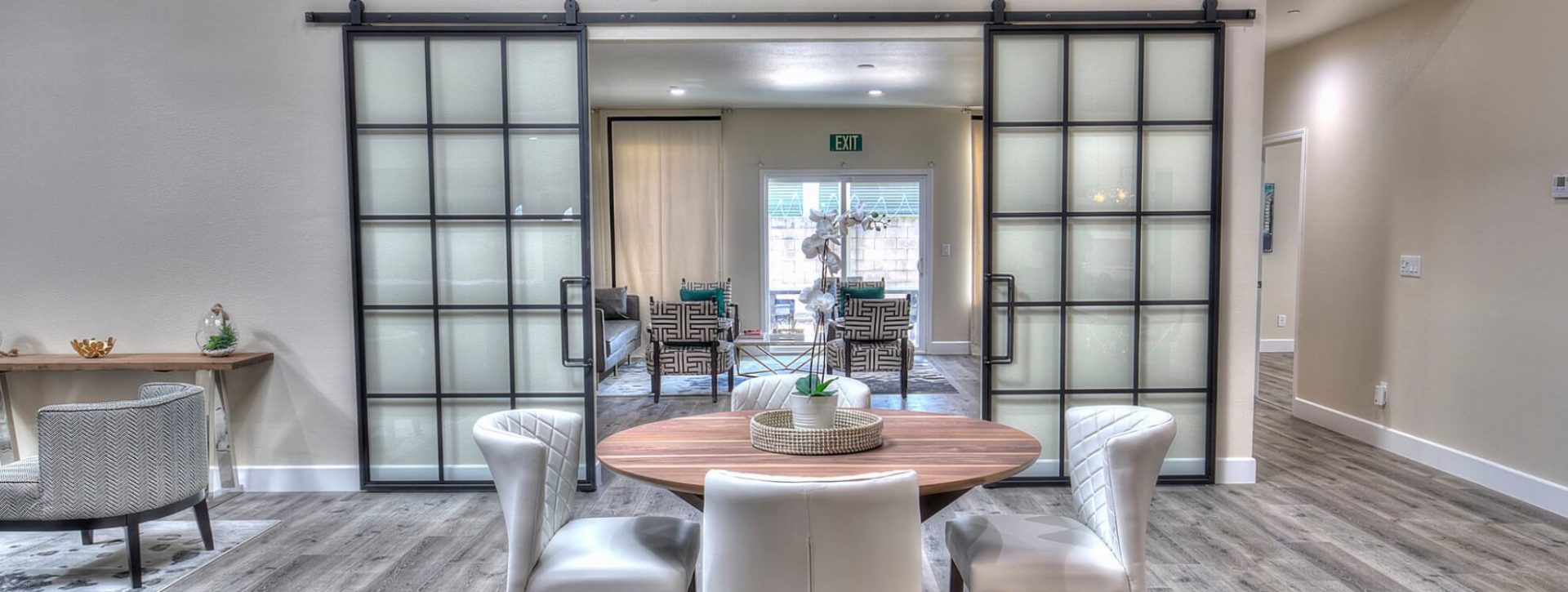

Outpatient rehab is an effective treatment for substance use disorder (SUD) and alcohol use disorder (AUD). With outpatient care, clients have the opportunity to receive help for drug or alcohol addiction without disrupting their daily work, school or family obligations.
If you or a loved one has a substance use disorder, outpatient addiction programs can help. Treatment providers will discuss your goals and create a custom plan to help you through the recovery process. Ending substance use is just the beginning, but outpatient care can provide the support, encouragement and medical care you need to overcome the battle.
Here, we’ll provide an overview of outpatient drug rehab programs, their benefits and the types of outpatient treatment and services available to help you or a loved one live a healthy, substance-free life.
Verify Your InsuranceOutpatient rehab care is a type of non-residential, therapy-based addiction treatment. Unlike inpatient rehab, this type of treatment allows clients to meet most days of the week and leave at night to tend to life obligations. It often provides a step-down approach, where the number of meetings lessen based on how far along the individual has come in their recovery.
Outpatient addiction centers consist of health care providers and addiction specialists, including nurses, licensed therapists and counselors. You’ll often attend group therapy, where you can discuss your recovery with others experiencing addiction and lend your support to others. Outpatient programs provide attention to the complicated psychological and physical aspects of addiction, including withdrawal, co-occurring mental health disorders and addiction triggers, to prevent relapse.
Substance use disorder and alcohol addiction are complicated issues, often impacting a person’s entire life, from work and health to interpersonal relationships. Thankfully, there are numerous levels of outpatient treatment programs designed for recovery assistance. These programs can help clients overcome potential triggers and achieve long-term sobriety.
Your team of treatment providers ensures you receive suitable treatment solutions based on your diagnosis and recovery goals. You’ll have various treatment options until you and your treatment team find the best ones to help you manage your symptoms and feel better.
The outpatient rehab treatment approach involves a flexible schedule that allows clients to have free time while maintaining long-term treatment plans. It can help you settle back into your life after beginning recovery in residential treatment centers or help those with mild to moderate addictions. You may benefit from outpatient rehab programs if you must maintain your regular responsibilities while undergoing treatment.
While following your personalized outpatient treatment plan, you’ll live at home and commute to the treatment facility to attend therapy sessions and support groups. These programs typically consist of 10 to 12 hours a week visiting the center to receive:
Along with attending individual and group therapy sessions, you’ll also learn healthy habits, better coping mechanisms, relationship training and distress tolerance for stressors that might contribute to substance use. The treatment that works for you will differ from programs that work best for others. However, outpatient care is generally helpful for people who don’t require intensive care or those who cannot afford to take time off from work for inpatient care.
Unlike residential inpatient programs, outpatient care is often spread out over a more extended period and lasts anywhere from three months to over a year, depending on your unique needs and the treatment facility you visit. Because of this extended timeline, outpatient care can even be more helpful for some clients than inpatient rehab, especially those who need a consistent routine.
Those who begin their recovery journey with outpatient care can continue working, remaining close to their support system and attending meetings and treatment in the mornings or evenings so their daily schedule is not disrupted.
The primary types of outpatient rehab care include partial hospitalization programs (PHP), intensive outpatient programs (IOP), outpatient detox and sober living homes.
After clients receive an assessment from a doctor or other qualified addiction professional, outpatient treatment plans are often recommended. However, they’re typically reserved for those with less severe drug or alcohol addictions, who don’t have other mental health disorders and who have a supportive home environment.
When clients first enter an addiction treatment center, they undergo a psychological evaluation. The initial assessment helps therapists and counselors create a personalized dual-diagnosis treatment for addiction and underlying mental illnesses. After the assessment, the client may have the option to partake in any of these outpatient treatments:
Partial hospitalization programs provide intensive addiction treatment without overnight stays. Clients who choose PHP typically undergo medical monitoring Monday through Friday for one to two weeks. Clients can also expect a psychiatric evaluation so counselors and therapists can design a plan to treat underlying mental health disorders.
While in PHP, clients will receive the following:
PHP uses day treatments to ensure you get the treatment you need while still having flexibility within your everyday schedule.
Intensive outpatient services provide support for clients while maintaining their independence. Like PHP, intensive outpatient programs can provide medication-assisted detox and therapy sessions to treat addiction.
IOP allows clients to participate in a few therapy sessions for around four days a week while returning home at the end of their sessions. Depending on your schedule and preferences, you can often choose from day or evening outpatient programming.
IOP is often less intensive than PHP and is reserved for clients who do not require constant medical supervision for their addictions. There are several similarities between IOP and PHP, however, including:
Outpatient detoxification helps clients safely and comfortably taper from drugs or alcohol. Unlike the above programs, an outpatient detox program allows clients to receive detox from their own homes.
Medically assisted outpatient detox programs include check-ins with nurses who evaluate each client’s progress as they move through the detox process. These programs are often more affordable since they don’t require you to attend frequent appointments needed by other addiction programs.
While you’ll receive in-home detox without constant supervision, medical professionals will prescribe medicines to keep you comfortable. This program can help you maintain a positive, healthy environment until you feel better.
A sober living home is a substance-free environment to help you maintain sobriety and remain independent while receiving compassionate support. Sober living homes can also be used as intensive settings for clients after completing outpatient programs or for those worried about relapse. These spaces can help you recover from addiction outside a 24/7 supervised inpatient setting, allowing you to remain independent and receive the intensive treatment you need.
Sober living homes provide:
Staying in a sober living home is an excellent next step for those recovering from addiction. You’ll receive continued support while building routines that help you follow relapse-prevention techniques.
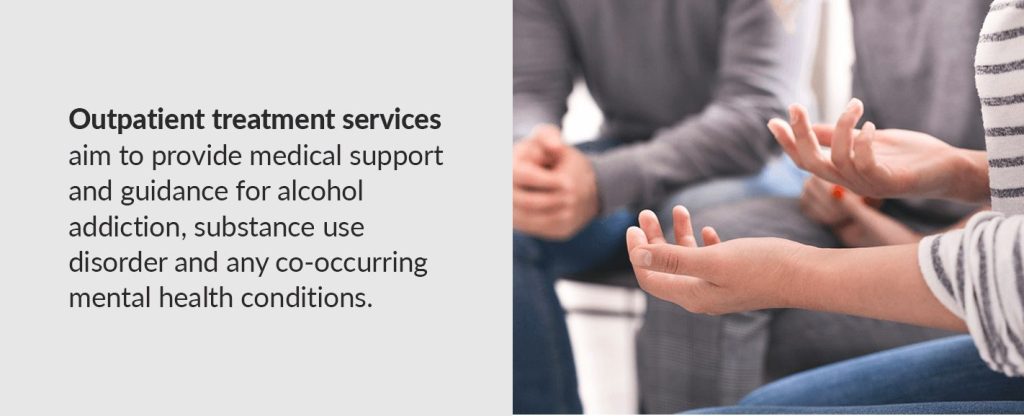
Outpatient treatment services aim to provide medical support and guidance for alcohol addiction, substance use disorder and any co-occurring mental health conditions. Programs are designed to treat the entire client rather than just the symptoms — supporting the individual’s overall health and wellness at every step.
Outpatient treatment services typically include:
Programs differ based on the treatment center and your needs, but you may receive these services:
Quitting drugs and alcohol is essential to sobriety, but many find it difficult because of the intensity of withdrawal symptoms you experience while your body detoxes. That’s why it’s beneficial to seek professional help to taper from substances gradually. Medical experts can help you safely eliminate drugs or alcohol from the body by using prescribed medicines. These medicines can help you overcome uncomfortable symptoms of withdrawal, such as:
While withdrawal symptoms and intensity will vary from person to person and the specific substance they’ve been using, most medicines prescribed in medication-assisted detox can help with these uncomfortable physical and mental feelings. Physicians will monitor your needs, customizing your detox program to help you recover comfortably.
When you go to outpatient care for drug or alcohol addiction treatment, you can receive several types of therapies to help you through recovery. A dual diagnosis can help health providers plan an effective therapeutic path for your needs. Therapy can help you understand your addiction better, learn coping skills to avoid relapse and help you achieve overall greater well-being.
Several mental health disorders are associated with addiction, including:
Outpatient programs often include support group meetings a few times a week. While many people isolate themselves from loved ones when struggling with addiction, group therapy places you with people who understand your situation, triggers and struggles firsthand. Isolation can worsen addiction, which is why support groups are beneficial when you’re attempting to recover.
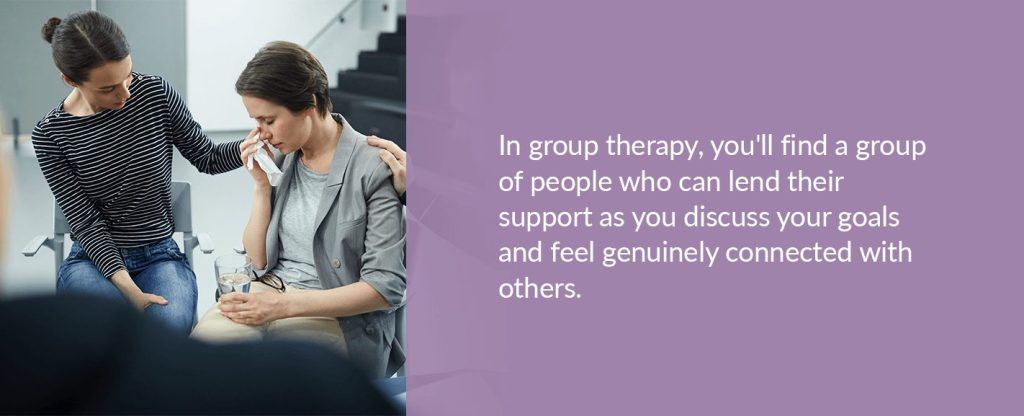
In group therapy, you’ll find a group of people who can lend their support as you discuss your goals and feel genuinely connected with others. You might find groups for specific addictions or ones open to people recovering from any dependence. Whatever you prefer, you can find encouragement and accountability when you attend weekly support groups in outpatient treatment.
Support groups provide a judgment-free space where you can discuss your experiences and urges with others going through the same challenges. What’s more, you can find empowerment and encouragement as you share healthy coping strategies and hold each other accountable. You can rest assured that you won’t be judged for your experiences and urges since everyone in the room shares similar struggles.
Overall, support groups provide helpful advice and resources from those who understand your triggers. And perhaps most importantly, it can create friendships and mutual healing, which are often beneficial for recovery.
Often, outpatient treatment facilities will also recommend or provide aftercare programs to help you maintain your long-term sobriety and healthy lifestyle. Forms of post-rehabilitation care include:
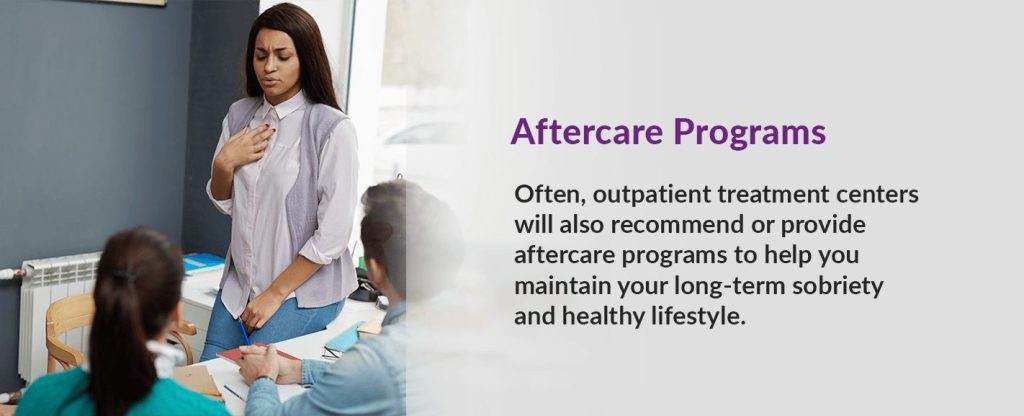
Outpatient programs can also include an individualized post-rehabilitation care plan based on your needs.
Outpatient therapy for drug and alcohol addiction is an excellent way to address issues that contribute to substance use disorder. Behavioral counseling will likely be part of your outpatient treatment plan, where clients learn to recognize and avoid situations that can lead to substance misuse and make positive changes for long-term sobriety.
You’ll first undergo a psychiatric evaluation when you enter an outpatient treatment center. This way, counselors can diagnose any behavioral, developmental, emotional or medical problems that may have contributed to your substance use.
When addiction and other disorders coincide, it’s called a co-occurring disorder. Therapists and counselors can help address co-occurring disorders in outpatient treatment centers through the following types of therapy:
In outpatient treatment, you might attend therapy sessions just a few times a week to maintain your home and work life while working toward recovery.
While mental health conditions can make it more difficult for clients to achieve long-term sobriety, therapists and counselors will help you get to the bottom of your addiction and mental health history and provide actionable steps for moving forward. When you understand the triggers that may contribute to your addiction, you can work on overcoming them.
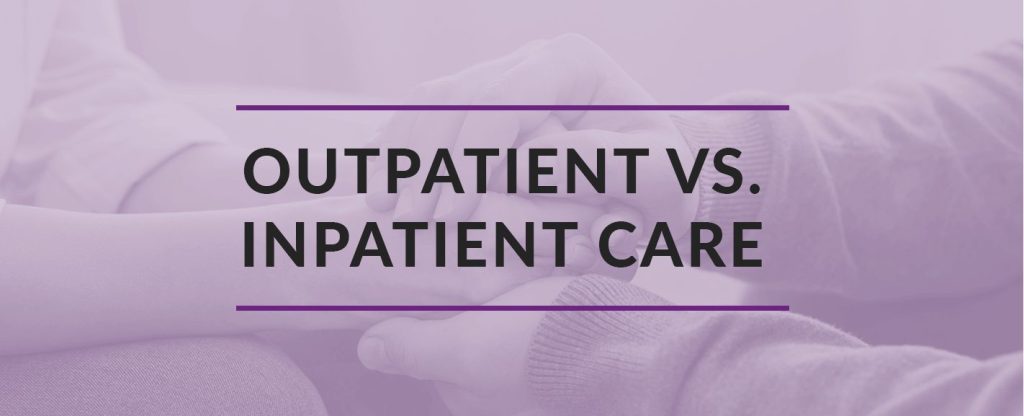
There are several differences between outpatient and inpatient care, with the primary difference being that inpatient treatment requires clients to live at the treatment center 24/7. Determining the best treatment option for you depends on the severity of your condition and other factors, though both are effective forms of drug and alcohol addiction treatment.
Outpatient care involves:
Inpatient treatment involves:
People struggling with severe drug or alcohol addiction might face a more significant challenge of maintaining sobriety in an outpatient center, especially in the early stages of recovery. If substance misuse is interfering with your life, relationships, job and medical or mental health, inpatient addiction programs might be your best option. Inpatient programs are also more suitable for clients who don’t have a supportive home environment.
On the other hand, outpatient treatment is often the more affordable option, as it only involves a few weekly treatments at the client’s preference. It also benefits those who need to care for work or home obligations while receiving addiction treatment and support from highly trained professionals.
Many people with an SUD find many benefits in outpatient treatment, especially those with mild to moderate addictions. These programs are more flexible and accessible than inpatient programs.
Some of the most significant reasons to consider outpatient addiction treatment include the following:
Since outpatient care allows clients to live at home during treatment, you won’t have to pay for the costs of lodging at a residential treatment center. Many insurance companies are also more willing to cover outpatient treatment costs, making these services more affordable than inpatient care.
Another significant reason clients opt for outpatient drug rehab programs is the ability to tailor treatments to suit their schedules. Unlike inpatient treatment, where the client is at the center for 24 hours every day, you can control when and how often you visit the center and the therapists and counselors you see during treatment.
The flexibility of outpatient programs helps personalize your recovery even more than inpatient services, allowing specialists to help you meet your specific needs. This is beneficial for those who cannot leave their families or jobs for an extended period or for adolescents who must maintain a regular school schedule — which is crucial given how susceptible adolescents are to drug and alcohol addiction.
At Diamond House Detox, we offer intensive outpatient treatment plans in the morning, evening and off-hours so clients can take care of essential tasks while receiving treatment. The option is especially beneficial for parents and caregivers who can’t afford to stay at an inpatient center or hire caregivers in their absence.
Throughout outpatient rehab programs, support and family involvement are beneficial, as being around loved ones can encourage you on your path to sobriety. Most intensive outpatient programs let clients invite significant others, family and friends of the client to therapy sessions to help promote the positive relationships relevant to obtaining sobriety.
SUD treatment involves collaborative, partnership-based models of care and recovery plans. Positive and caring connections can help encourage and maintain sobriety in people struggling with drug or alcohol addiction. Essentially, strong social bonds weaken a person’s bonds with substance use, and outpatient care incorporates these ideas into your custom treatment plan.
Attending therapy and treatment programs while living at home allows clients to practice what they learn in real-world situations. For instance, you might learn healthy coping skills to navigate settings that could increase temptation or drug cravings. When you return home after treatment, you can learn how to avoid these situations by practicing what you know.
You can then return to your program to report your progress, allowing therapists and specialists to adjust your plan as necessary. Therapy sessions also allow you to discuss new techniques and challenges to help you overcome specific triggers in your life, such as certain people or places that contribute to substance use.
While outpatient treatment is generally less intensive than inpatient care, it can be just as effective. At Diamond House Detox, we even offer sober housing for PHP clients, making outpatient the affordable yet equally effective plan for you since the programs are generally very similar yet offered at a lower cost.
While you won’t have 24/7 medical supervision, sessions are instead spread out across months, which is helpful for your overall recovery and long-term sobriety. Staff will help you treat co-occurring mental health disorders, provide therapy and detox, promote healthy habits and activities and recommend aftercare programs, all in one setting. Each plan is customized to your specific needs, and staff will monitor your progress and adjust your path and goals as needed.
As stated, social bonds are beneficial to your recovery, and outpatient care emphasizes this with its flexible scheduling. Clients can remain close to supportive friends, family members and significant others while receiving treatment. This helps you maintain that solid support network.
Intensive outpatient programs also provide medication-assisted detox, so you can live at home with your support system while tapering from drugs or alcohol. Medical detox promotes your safety and comfort, and outpatient centers provide experienced professionals to help you through the process.
While no single drug or alcohol treatment strategy guarantees recovery, a supervised detox program, support systems, and medical assistance in IOP can increase the odds of effectiveness. Detoxing on its own won’t cure substance use disorder, though it can help you advance comfortably to the following stages of recovery. In our detox program, you’ll also receive mental health support and aftercare assistance for long-term success.
In outpatient programs, you’ll learn healthy sobriety tools to take with you post-treatment. In outpatient therapy programs, you’ll learn to replace self-destructive habits with positive ones that are good for your overall health and wellness.
Therapists and peers might discuss techniques such as mindfulness meditation, journaling, hiking and other recreational activities and strategies for avoiding temptation. Ultimately, these and other tools can help you regain self-confidence and optimism about staying sober and living a healthier lifestyle.
We’ll now answer some common questions about outpatient rehab:

Generally, most insurance carriers cover outpatient treatment costs. Many rehab centers that offer outpatient addiction treatment accept payments from insurance companies. However, not all insurance policies are the same, and many vary in coverage and benefits.
Before treatment, you’ll want to contact your health insurance company or review your policy to determine the particulars of your coverage. Feel free to contact us at Diamond House Detox for any questions regarding your treatment insurance coverage. You can learn more about the insurance we accept through our insurance verification form.
The length of outpatient treatment is typically around three months, though individuals in recovery can visit with a therapist and other specialists for as long as they want. At Diamond House Detox, our PHP provides medical monitoring Monday through Friday for one to two weeks. In our intensive outpatient program, clients can participate in three-hour therapy sessions up to four days a week, offered during the day and in the evening.
The cost of outpatient treatment will depend on your treatment center and your type of insurance. Most people only pay a minimal co-pay for each therapy session, and many therapists offer a sliding scale to help those who have difficulty paying. The length and frequency of sessions also factor into outpatient care costs. At Diamond House Detox, we’ll work with you to find the most cost-effective access to our treatment.
At Diamond House Detox, we offer a wide range of addiction support groups to help you feel fully supported toward drug or alcohol addiction recovery. These groups include:
Outpatient treatment is ideal for clients with drug or alcohol addiction who do not have time for intensive care. However, while flexibility is one of the main advantages of outpatient treatment, this does come with considerations. For example, some people may be tempted to misuse substances or alcohol when not in supervised care. In an outpatient setting, you’re closer to your old environments and triggers, making it challenging to stay sober for some.
As a result, outpatient treatment services might be the best option if you:
Your decision to partake in outpatient rehab services will depend on your addiction severity, treatment goals and support network. Those who learn coping skills to help in moments of temptation are less likely to relapse, making them stronger candidates for outpatient programs.
Before seeking out an outpatient treatment program for yourself or a loved one, you can determine the following and arrive with this information:
We believe in treating the entire person rather than just symptoms at Diamond House Detox. Our recovery programs address the mind, body and spirit. We take a holistic approach to help clients become agents in their recovery, providing evidence-based treatments that focus on treating co-occurring disorders or underlying mental health symptoms.
We aim to aid your physical, emotional and psychological recovery to help you achieve better health and an overall greater sense of well-being.
Our team focuses on you, making sure you get the tools, resources and support needed to complete your program. We answer all your treatment questions and provide solutions to help you along your recovery journey. With a compassionate, caring team supporting you, you’ll feel safe while receiving treatment at our facility.

Outpatient addiction treatment provides many benefits for so many people. If you or a loved one has a substance use disorder or AUD, know you are not alone. When you enter outpatient rehab care at Diamond House Detox, you’ll find a team of licensed therapists and physicians eager to help you through the recovery process.
Our highly trained health providers and addiction specialists will design a personalized treatment plan that works for you. Whether it’s PHP or IOP, we provide outpatient treatment services with the same level of commitment and insight as our residential treatment services. We can empower you to get on a healthy track and continue that with aftercare post-treatment. You’ll gain support and encouragement from others experiencing addiction while building healthy coping mechanisms needed for long-term sobriety.
We offer outpatient rehab treatment services at our locations throughout northern California. Whenever you or a loved one needs additional support and education to handle a mental health condition or addiction, come to Diamond House.
To learn more about our outpatient addiction treatment programs, contact us today.